By now, most are aware that a group of mercenaries tried to invade Venezuela, entering illegally by sea from Colombia, after which they planned to work with local supporters to kidnap President Nicolas Maduro, kill him or hand him over to the US authorities; they called the plan “Operation Gideon”.
There is nothing new under the sun: Venezuela has been targeted by US imperialism since Hugo Chávez took office in 1998. The local (and regional) pro-imperialist opposition has been working relentlessly to bring about regime change in what could be called a “continuous coup”. Economic, political, financial and military pressure has been applied without relief. Diverse tactics and strategies have been used seeking to eliminate Chavismo and take control of the country. Having Venezuela as part of the imperialist camp would be a massive asset to imperialist interests and power. However, is it possible for Washington to provoke regime change, launch a military invasion, navigate the chaos, and defeat the powerful and popular chavista revolution? Perhaps not, and as a result, endless war may be the new norm, and furthermore, perhaps no winner needs to be declared for the imperialists to get what they want.
A CONTINUOUS COUP
Let’s look back at some of the highlights of the right-wing-pro-imperialist front since Maduro´s first term in office (2013), a political movement which has played hardball in open confrontation with the Bolivarian government as instruments of Washington.
The first maneuver consisted in ignoring the April 14, 2013 election results –the electoral process following the death of Hugo Chávez, intended to undermine the legality and legitimacy of the new government. At that time, Henrique Capriles Radonski was still the opposition’s main public figure.
On February 12, 2014, “La Salida” plan (“The Output”) was launched against the government: sabotage and chaos was enacted in order to foster a climate of civil war, take power and incarcerate the president. There were assassinations, ambushes, attacks on the property of the state and the PSUV, along with a permanent press operation that circled the world with remarkable discipline and method. Leopoldo López, the opposition mayor of Caracas, sat at the forefront. Together with María Corina Machado, they called on the country to take to the streets. The revolt ended up in 44 deaths, 878 injured and losses amounting to over ten billion dollars. The world learned all about the “guarimbas”, violent armed opposition clash groups which starred in these events, and which curiously enough had a similar aesthetic to that of the Ukrainian groups that staged the Euromaidan.

Although the government came through in the end, the opposition front achieved one goal: implanting the idea of their political persecution. Some of the coup efforts’ main authors ended up in jail, including López (who participated in the assault on the Cuban Embassy in Caracas on April 12, 2002, denouncing “Castro-Communist” interference in Venezuela, as part of the coup against Chávez).
In February 2015, the government uncovered the so-called “Jericho Plan” for the aerial bombing of the Miraflores Palace (government headquarters) by a group of Air Force rebels and their plan for the assassination of President Maduro. Julio Borges, the deputy of the National Assembly (Justice First alliance) was the main culprit.
In December 2015, the opposition formed the Democratic Unity Table (MUD) and managed to prevail in the legislative elections for the National Assembly, demanded Maduro’s resignation, tried to prosecute him for insanity, lied about his nationality and then tried to shorten his term in office. At the end of April 2016, they attempted to kick off a process to request the revocation of his authority but failed in the attempt in part by committing fraud by signing dead people to the vote.
In October 2016, the National Assembly held a session under the order of the MUD and declared itself in open rebellion, reaching the paroxysm of declaring that President Maduro had carried out a coup d’état, thus violating the constitutional order. The opposition requested all international organizations to apply sanctions against their own country. A deputy then proclaimed himself as the “legitimate president” emerged: one Juan Guaidó.
At the same time, OAS Secretary General Luis Almagro was pushing for sanctions against Maduro’s government, turning the entire organization against Venezuela, playing the Democratic Charter, recognizing Guaidó, explicitly requesting Maduro’s departure and supporting Venezuela’s expulsion from MERCOSUR.
Trump then took over as president and continues today to set his sights on Venezuela, making nearly permanent threats of invasion and unleashing a storm of sanctions while bolstering the general financial siege strategy against the Venezuelan economy. A total of seven executive orders were issued since August 2015, the first of which was issued under the Obama administration, and the other 6 under Trump. The first of those (E.O. 13808, August 2017) targeted the PDVSA. The last (E.O. 13884, August 2019) constitutes an embargo, as it blocks all property of the Government of Venezuela and prohibits transactions with the country. Besides attacking the Venezuelan people, Trump’s illegal sanctions have been shaped to create divisions within the country’s civil and military leadership, fostering a scheme of incentives and rewards, such as the suspension of sanctions for those who cooperate in the overthrow of Maduro.
The similarity of this strategy to political scientist Gene Sharp’s in his essay “From Dictatorship to Democracy: A Conceptual Framework for Liberation” is remarkable. During the ´80s and ´90s Washington found ways to achieve its objectives without using direct force. Sharp designed what he called the “non-violent struggles”, something “much more complex and varied means of struggle than is violence. Instead, the struggle is fought by psychological, social, economic, and political weapons applied by the population and the institutions of the society. These have been known under various names of protests, strikes, non-cooperation, boycotts, disaffection, and people power”. He outlined several ways and phases of influencing or over-determining events in other countries, defined as destabilization and indirect intervention, also known as soft coups. First, create the potential for unrest (e.g. promote false rumors; anti-corruption movements). Second, create the image of an “authoritarian” leader, ruling an authoritarian regime (human rights; freedom of speech). A third phase, step up political and social struggle. Fourth, psychological warfare operations and destabilization of the government, creating a climate of “ungovernability”, turning the people against their leaders, feasible under the umbrella of international pressure, including political and economic sanctions. Finally, the fifth phase: forcing the government to resign prior to an international military intervention.
2016-2020: CONTINUED CONSPIRACY
Diosdado Cabello, president of the National Constituent Assembly, released a brief chronology informing about the attacks to the government between 2016 and 2020, all of them, marked by radicalization and militarization:
-December 2016 – January 2017. “Operation Sword of God”. Objective: selective assassination (Diosdado Cabello, Tareck El Aissami)
-January 2017. “Operation Baduel”. Objectives: carry out a coup, impose a Transitional Government Board chaired by Raúl Isaías Baduel.
-June 2017. “Operation Victoria”. Objectives: boycott the election of the National Constituent Assembly; assault the Caribbean Brigade.
-March 2018. “People’s Transition Movement”. Objective: prevent the holding of the presidential election; assault military units.
-May 2018. “Paramacay II”. Objectives: impede the holding of the presidential election, take over emblematic units of the Bolivarian National Armed Force (FANB).
-May 2018, one day before the presidential election. “Commands of the Sea, Operation Armageddon.” Joint operation with the CIA and the Department of Defense. Objective: suspend the presidential election; take up Francisco de Miranda Air Base, the Chief of the Strategic Operational Command (CEO) of the Bolivarian Armed Forces, and the Ministry of Defense.
-April 30, 2019. “Operation Freedom”. Backed by USAID. Objective: overthrow the legitimate government of President Nicolás Maduro, free Leopoldo López, relaunch Juan Guaidó. Before 26 days of unrest, a deserting group from the FANB attempted to rally troops to oust Maduro with weapons stolen from the Legislative Federal Palace. Four captains and a lieutenant were arrested and charged before military courts.
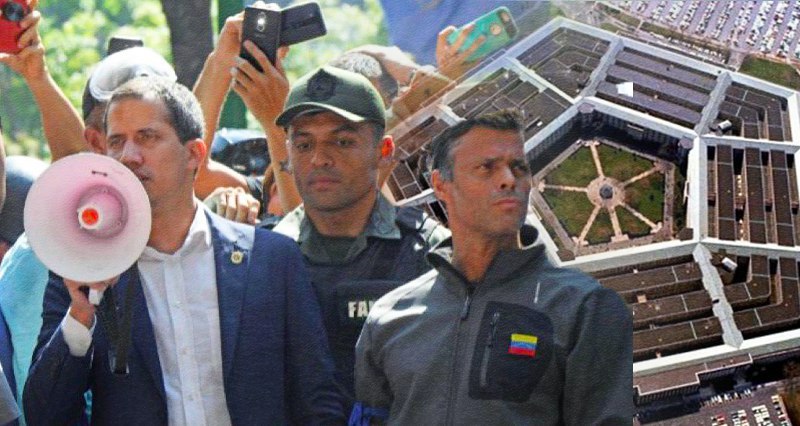
-June 2019. “Operation Turn Faces”. Along with the CIA, Cliver Alcalá Cordones and Josnars Adolfo Baduel Oyoque. Objective: overthrow the government of Nicolás Maduro; assassinate high officials of the Bolivarian government.
-August 2019. “Strength and Freedom”. Objective: overthrow the government; attack the national territory with mercenaries trained in Colombia and leaded by Cliver Alcalá Cordones; attack specific targets with explosives (National Courthouse, Venezuela Special Action Force in Cotiza; headquarters of revolutionary movements “Collective January 23”); political assassinations; selective military uprising.
-January 2020. Joint military exercise between Colombia and the U.S. Paratroopers from the 82nd Airborne Division and the National Army of Colombia near Tolemaida Air Base, Colombia. U.S. Southern Command sponsored the exercise.
-In March 2020, the maneuver against Venezuela was completed: the U.S. Attorney General, William Barr, presented charges of drug trafficking against the Venezuelan president, Diosdado Cabello, the Minister of Industry and Production Tareck El Aissami, the Minister of Defense Vladimir Padrino López and the president of the Supreme Court of Justice Maikel Moreno. Mike Pompeo signed an official statement authorizing the offer of a reward of up to $15 million for information on them. This made it clear that the US had outsourced the war against Venezuela by taking advantage of the ecosystem of military contractors and irregular-criminal groups that inhabit Colombia (and to a lesser extent Venezuela), already operating systematically, advised and trained by CIA and Israel experts in set up situations, rural population control or counterinsurgency in areas with strategic common resources (e.g. assistance to the Colombian military to protect oil pipelines), revealing the fresh experience accumulated in the Maghreb and Middle East.
-Finally, on May 3, 2020, a group of mercenaries begins a seaborne terrorist incursion in Venezuela, Operation Gideon, repelled by the government forces.
THE MAKING AND FAILURE OF OPERATION GIDEON
Juan José Rendón is a Venezuelan living in the US, a strategist, a specialist in communication and information, and one of the main allies of Álvaro Uribe and Juan Manuel Santos in Colombia. He has developed a communication coup industry and has been fighting Chavismo from the very beginning. He was recently interviewed by CNN where he indicated that since the end of 2019, based in Bogotá, he has been participating in meetings with different groups and regional political figures to push “regime change” in Venezuela, topple Maduro’s government and form a “National Emergency Government”. In these meetings, participants discussed different options “of alliances with other countries, actions, uprisings of people from within and the use of probable actors outside, such as retired military”. Operation Gideon evolved from this center.
Rendón and Guaidó signed an 8 page contract on October 16, 2019 for $213 million of unspecified “general services” to be provided by Silvercorp USA Inc., a private security firm (dedicated to counter-terror agents in schools “disguised as teachers” in Florida), run by Jordan Goudreau, a 43-year-old former US Green Beret and veteran of the wars in Iraq and Afghanistan. The plan was to sneak into Venezuela in a military operation, aiming at the “capture and delivery” of key members of the Bolivarian Government accused by the US of drug trafficking. Rendón said he paid $50,000, but Goudreau publicly acknowledged that he never received the agreed amount and provided copies of the contract (there is also a recording of their phone conversation while they were signing it). Maduro accused the group of swindling Goudreau.
Goudreau’s focus on Venezuela started in February 2019, when he worked security at a concert in support of Guaidó organized by a British billionaire (“Venezuela Aid”) on the Venezuelan-Colombian border. In a telephone conversation with VOA, he indicated that he was working with “a political opposition with many years of struggle, but without concrete results, which gets nervous when they see that the pressure channels are not enough to provoke change”. The opposition, however, pulled out, with the exception of the Guaidó/Rendón sector, Goudreau told the Associated Press. Goudreau was introduced to a rebellious former Venezuelan military officer named Cliver Alcalá, the ringleader of the Venezuelan military deserters in Bogota. He is now in federal custody in New York awaiting trial on narcotics charges.
Chavismo faces a political opposition operating in tandem with and monitored alternately by the Republican IRI or the Democratic NED, which is part of why it has been impossible to reach an agreement with them. An eye-catching outcome of the botched mercenary operation is the growing tensions within the pro-imperialist opposition front. Guaidó, as Washington’s useful pawn, hasn’t won any victories for the empire, and is now listed as the commander of yet another embarrassing failure and linked to serious corruption because of the use of resources provided by the Trump Administration (the stolen money the US Department of the Treasury authorized to transfer as payment to execute illegal debt payments and onerous salaries to Venezuelan deputies subject to US guidelines). Will the entire Guaidó strategy need to be scrapped? Perhaps his usefulness to Americans is now higher if he is imprisoned or killed. The usefulness of opposition pawns lies not only in their ability to keep tensions high, but also in that they are interchangeable or disposable.
After the failure, Rendón ended up resigning from opposition leader Juan Guaidó’s team, but continues to argue that “all options are on the table”. Meanwhile, the Venezuelan General Prosecutor announced that he will request his extradition, as well as Silvercorp´s representative, both US residents.
OPERATION BLACK 1ST
The mercenary operation was supposed to involve 60 troops (45 of them which were immediately captured) invading Venezuela by sea, about 30 kilometers away from Caracas. As Alcalá said, they were living in three mobile camps in La Guajira peninsula in Colombia’s border region before the day of the attack. On that same day, Goudreau, along with former Venezuelan National Guard officer Javier Nieto Quintero, released a video confirming the operation which they described as an effort to sneak into Caracas and capture senior members of Maduro’s government, calling on Venezuelan soldiers to join them.
Operation Black 1st was the government’s response created for the capture of all those involved in the terrorist raid, resulting in 9 mercenaries deaths and a dozen captured between Sunday May 3 and Monday May 4 in the coastal area of La Guaira and Chuao (State of Aragua), in a joint effort between local fishermen, the regional police and the FANB. Those captured included two former US Special Operations soldiers identified as Luke Alexander Denman and Airan Berry, Josnars Adolfo Baduel Oyoque, son of Raúl Isaías Baduel (former Venezuelan rebel Minister of Defense) and Antonio Sequea Torres, the deserter captain of the National Guard who participated in the attempted coup together with Guaidó and López on April 30, 2019. Rifles, pistols, machine guns, ID cards, bank cards, a helmet emblazoned with an American flag were confiscated. Also two AFAG machine guns that were part of the Federal Legislative Palace’s weapons park stolen by seditious sectors on April 30, 2019, six land vehicles, a boat with two outboard engines, two notebooks containing details of the violent operation, satellite phones, uniforms and loaded cartridges of different calibers.
Denman confessed in a video that the first step was the armed seizure of Simon Bolivar International Airport in Maiquetía to ensure its control as a “beachhead” to allow the entry of US planes. The Venezuelan government found out about the operation and has followed up on it. Before that, on March 25, the Minister of Communication and Information, Jorge Rodríguez, informed the public and the Colombian government that there were at least three paramilitary training camps where mercenary troops were training with weapons and explosives to carry out terrorist attacks in Venezuela with the support of the US government and the government of Iván Duque. At that time (March 23), the Colombian National Police seized 26 AR-15 5.56-caliber assault rifles, silencers, 45 regular sights, 37 night sights and 30 laser sights, three bulletproof vests, four binoculars, two communication radios with 43 batteries and 15 helmets, among other items, according to a report by WRadio de Colombia. Alcalá acknowledged on his Twitter account that the seized weapons “were being transported in Colombian territory to begin the liberation (of Venezuela) by our National Armed Force”. He later confessed in a radio interview that the weapons “were part of an agreement between him and Juan Guaidó with US advisors and were intended to be used in an operation against Nicolás Maduro”.
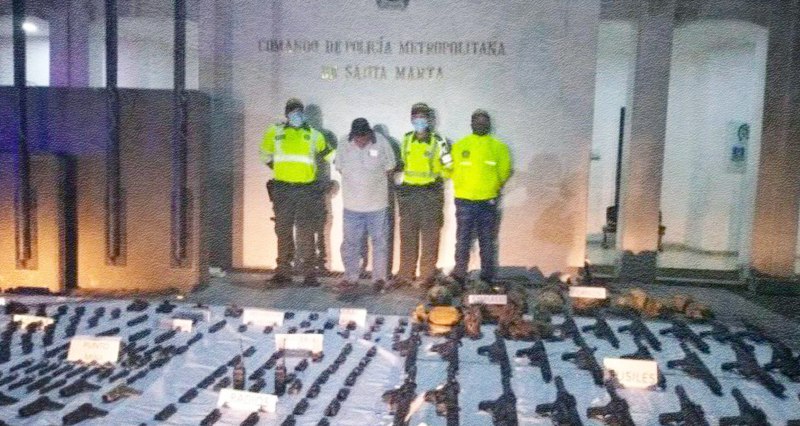
Since then, security forces continue dismantling different groups of mercenaries, criminal gangs and narcotics traffickers collaborating with the terrorist operation. Diosdado Cabello pointed out that in the operation, in addition to the Colombian government, the American government and DEA agents were involved. José Alberto Socorro Hernández, Alias Pepero, a Colombian drug, confessed that he was hired by the DEA to provoke shootings between drug traffickers and armed criminal gangs in popular areas in order to divert attention from the “secret” operation that took place on May 3.
It must be remembered: Hugo Chávez expelled the DEA from Venezuelan territory in 2005. The State Department, in response, began the classic maneuver of accusing Venezuela of drug trafficking. Despite the fact that Donald Trump denied any participation in the operation, the DEA is present on the ground. The DEA often infiltrates its agents into drug cartels, who become involved in drug trafficking, managing part of the business. Thus, narcotics traffickers become agents. The DEA and the drug traffickers are a single institution.
Operation Gideon came at a time of heightened pressure: the US has already formalized a 12-step plan that contemplates a transitional government (“Government Council” with two representatives of Chavism and a military chief of the current High Command as advisor), called the “Democratic Framework for Venezuela”. Pompeo stated that he has given instructions to develop plans to reopen the embassy in Caracas because a change of government was near. On April 30, Trump issued another executive order authorizing the Department of Defense to activate select reserves of the armed forces as part of a counter-narcotics operation in the Western Hemisphere. That same day, Trump announced that Navy ships were being moved towards Venezuela. Both Aruba and Curaçao are territorial headquarters of two US bases (Reina Beatriz and Hato Rey) from which the Southern Command coordinates a Forward Operating Location (FOL), spearheads of their supposed anti-drug operations.
As we wrote in another article for UWIDATA, Colombia has become a base of operations to attack Venezuela. The US has managed to install at least seven military bases there thanks to Plan Colombia, a military/security anti-narcotics program in force since 1990, which spanned 7 Colombian presidents. US.Senator Paul Coverdell commented when introducing the legislation to approve the budget for the plan (costing American taxpayers $11 billion between 2000-2020), explicitly defined its long term objective: to control Ecuador and Venezuela, two of the world’s main oil basins. Ivan Duque, the Colombian president, openly supported each and every destabilizing blow the US leveled. Attorney General Tarek William Saab openly said as much: “Colombia is today to Venezuela what Honduras was to Nicaragua during the 1980s. A hideout to form an irregular army destined to attack the neighbor” with the consent of Duque and his officials, Colombian intelligence services, police and armed forces.
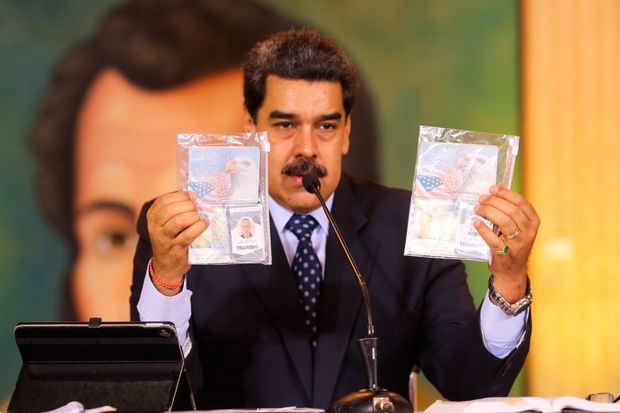
Informé al pueblo sobre la Operación Militar Negro Primero, “Aplastamiento del Enemigo”, que llevamos adelante en unión cívico–militar–policial para enfrentar las agresiones del imperio de EE.UU. y la oligarquía colombiana que pretende llenar de sangre nuestro suelo sagrado. pic.twitter.com/mz2wcqhJHZ
— Nicolás Maduro (@NicolasMaduro) May 5, 2020
What happened on May 3 must be understood within the framework of a multidimensional total war against the constitutional government of Venezuela. Despite the “failures” (and parodies) that we have seen, the aim is to lay siege, keeping Venezuela cornered, under constant pressure, blocked, and threatened by scarcity and shortage. This is a permanent hybrid open war driven by imperialism and designed for the 21st century.
VENEZUELA IS NOT ALONE
China, Iran and Russia have constantly denounced the aggressions against the governments of Chávez and Maduro with whom they have been building solid economic, political and security ties.
On May 12, the fifth shipment of equipment and supplies to combat COVID-19 arrived in Caracas from China. China’s ambassador to Venezuela, Li Baorong, said that “in difficult times China and Venezuela will always be together”.
After meeting in Moscow with President Putin (October 2019), Maduro declared that he received Russia’s support “in all fields of military technical cooperation”.
Russia, China, Turkey and Iran deplored the failed armed incursion into Venezuela, publicly acknowledging that it sought to provoke the destabilization of the South American nation and a coup d’état against President Nicolas Maduro.
Lavrov said Russian special services have been in contact and are ready to assist the president of the government in the investigation of the “incursion of mercenaries into Venezuela with the aim of carrying out sabotage operations, terrorist attacks and overthrowing the legitimate president”. Russia says it will ask the UN Security Council to address the recent armed infiltration attempt in Venezuela.
While the international military intervention strategy in Venezuela has yet to materialize, the invasions and occupations of Afghanistan and Iraq occurred, as well as the attack on Syria, as has the direct imperial interference and in several other countries of the Caribbean and Africa. Make no mistake, the US is at war with Venezuela, albeit unconventional warfare where the economy serves as the central battlefield, mediated by judicial logic and financial repression along with Fourth Generation Wars tactics and strategies. Nevertheless, Washington could also be leaning toward an escalation of mercenary actions for the development of an open war. Right now, four US warships are sailing in the Caribbean sea, 500 miles away from Venezuela. As Rendón said: all options are on the table.
The New York Times and The Financial Times recently published an article arguing the pertinence of suspending the blockade against Venezuela. At the same time, 11 Democratic Party senators have written a letter to Pompeo to defer or suspend the coercive measures in response to the Covid-19 outbreak since the measures have directly affected Venezuela’s public health system. Perhaps it is a matter related to the US elections, organized around the axiom that every American president needs a war. In one way or another both economic pressure and concrete actions persist, notably the blockade against socialist Cuba. The global hegemon must fight any power seen as a menace to the capitalist order and its cultural and social norms, crushing anything which might serve as an example for a different type of society.


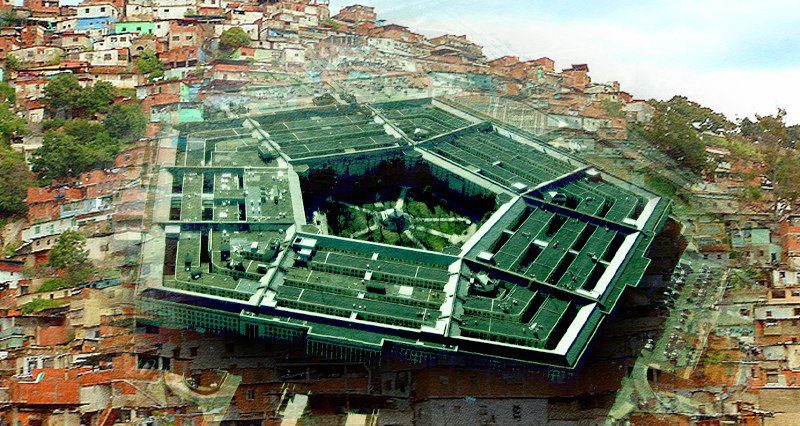
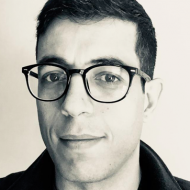
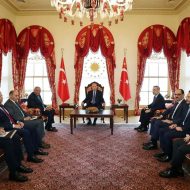
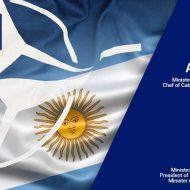



Leave a Reply